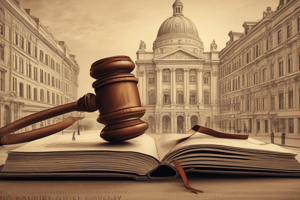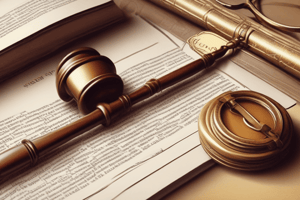Podcast
Questions and Answers
What is the purpose of a trust under the Securities (Amendment) Act 2013 in Jamaica?
What is the purpose of a trust under the Securities (Amendment) Act 2013 in Jamaica?
- To create a testamentary trust
- To appoint a trustee
- To benefit charitable institutions such as schools and universities (correct)
- To make provision for a non-charitable purpose
Who is the creator of an inter vivos trust?
Who is the creator of an inter vivos trust?
- Settlor (correct)
- Trustee
- Cestui que trust
- Beneficiary
What is a fiduciary relationship in the context of trusts?
What is a fiduciary relationship in the context of trusts?
- A relationship between the trustee and the settlor
- A relationship between the trustee and a third party
- A relationship between the trustee and the beneficiary (correct)
- A relationship between the beneficiary and the settlor
What is a requirement for a trustee to act?
What is a requirement for a trustee to act?
In what circumstances may the Crown act as a trustee?
In what circumstances may the Crown act as a trustee?
What is the result of the case of Re Vinogradoff?
What is the result of the case of Re Vinogradoff?
Who may not act as a trustee?
Who may not act as a trustee?
What is the significance of the case of Boardman v Phipps?
What is the significance of the case of Boardman v Phipps?
What is the primary obligation of a trustee in a trust?
What is the primary obligation of a trustee in a trust?
Who is primarily liable for payment on income tax from trust investments?
Who is primarily liable for payment on income tax from trust investments?
What is the purpose of a 'protective trust' or 'asset protection' trust?
What is the purpose of a 'protective trust' or 'asset protection' trust?
What is the role of a trustee in relation to trust income?
What is the role of a trustee in relation to trust income?
What is the legal status of a trustee in relation to trust property?
What is the legal status of a trustee in relation to trust property?
What is the purpose of a unit trust?
What is the purpose of a unit trust?
What is the meaning of a 'conduit pipe' in the context of trusts?
What is the meaning of a 'conduit pipe' in the context of trusts?
What is the primary purpose of a trust in succession?
What is the primary purpose of a trust in succession?
Flashcards are hidden until you start studying
Study Notes
Introduction to Trusts
- A trust is an equitable obligation that binds a person (trustee) to deal with property owned by them (trust property) for the benefit of others (beneficiaries).
- Trusts are creatures of equity.
Trustee's Responsibilities
- A trustee is required to safeguard the trust property and deal with it in accordance with the terms of the trust instrument.
- The trustee may be required to invest the trust property or convert it to rental property to generate income.
Ownership of Trust Property
- Beneficiaries are primarily liable for payment of income tax on trust investments (Baker v Archer-Shee).
- Trustees are the legal owners of trust property and can impose distress for rent arrears (Schalit v JN Ltd).
- The beneficial ownership of trust property is in the beneficiaries, with the trustee acting as a conduit pipe to convey the trust income (Comm.of Income Tax v Bank of Nova Scotia Trust Co.Ltd).
Purposes of Trusts
- Trusts can be used for succession purposes, to roll over the destination of family property on death.
- Trusts can protect family property from spendthrifts through "protective trusts" or "asset protection" trusts.
- Trusts can facilitate investments through unit trusts, which are pooled investments schemes that pass profits back to individual investors.
- Trusts can benefit charitable institutions, such as schools, universities, and hospitals.
- Trusts can be used for non-charitable purposes, such as to upkeep the testator's tomb.
Nature of Trust and Trusteeship
- A trustee is the person with the legal title of the trust property.
- A beneficiary is the person who benefits from the trust or has a beneficial interest in the trust.
- A settlor is the creator of the trust.
- The office of trustee is onerous.
- The trustee-beneficiary relationship is a fiduciary relationship.
Trustee's Duties
- A trustee must act in the best interest of the trust.
- A trustee must act in accordance with the terms of the trust.
- A trustee must exercise probity (moral, honest, and decent behavior).
- A trustee must not enrich themselves from the trust.
- A trustee must avoid conflicts of interest between their personal interests and those of the trust.
- A trustee must have the legal capacity to act as a trustee.
- A trustee must forego opportunities that come to them in the office of trustee that would otherwise not be available to them (Boardman v Phipps).
Who May Act as Trustees
- Minors and mentally disturbed persons cannot hold property and therefore cannot act as trustees.
- The Crown may act as a trustee where it deliberately chooses to do so, but this is rare (Civilian War Claimants v R).
Types of Trustees
- A trustee can be a corporation.
- A trustee can be an individual.
Studying That Suits You
Use AI to generate personalized quizzes and flashcards to suit your learning preferences.



